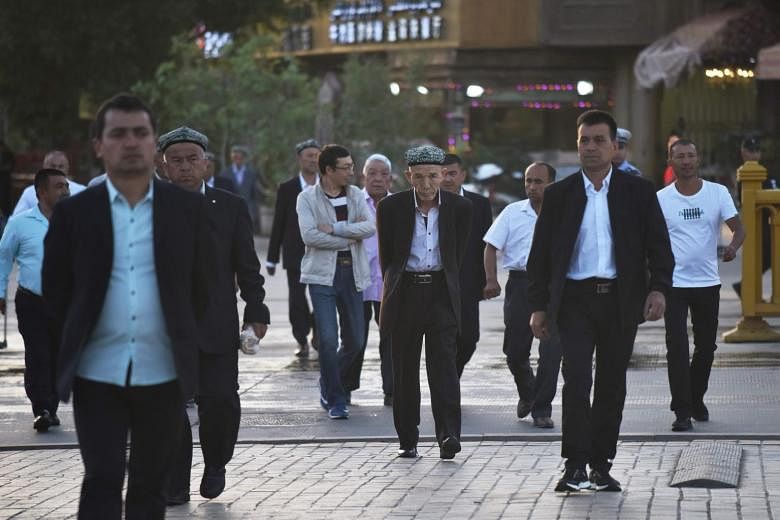SINGAPORE (REUTERS, AP, WASHINGTON POST) - Already-strained relations between China and the United States were further muddied after the US Congress overwhelmingly approved a Bill targeting Beijing's mass crackdown on ethnic Muslim minorities on Wednesday (Dec 4). Here's what you need to know:
WHAT IS THE UIGHUR ACT?
The Uighur Act requires the US president to condemn abuses against Muslims and calls for the closure of mass detention camps in Xinjiang.
The Act would sanction senior Chinese officials involved in the country's mass detention of its Muslim Uighur minority.
WHO DOES THE ACT TARGET?
The Uighur Act would probably target officials including the Xinjiang regional Communist Party chief, Mr Chen Quanguo, a member of the ruling party's elite 25-person Politburo whom researchers consider responsible for overseeing the detention and surveillance programme in Xinjiang.
It would also ban exports to China of items that can be used for surveillance of individuals, including facial and voice-recognition technology.
WILL PRESIDENT DONALD TRUMP SIGN THE ACT INTO LAW?
Senate approval of the Act is expected within the next two weeks and could be unanimous. The White House has not commented on the legislation, but Mr Trump may have no choice but to sign it as he did the recent Bill supporting human rights in Hong Kong.
WHAT IS XINJIANG AND WHO ARE THE UIGHURS?
Xinjiang, in China's far north-west, is the country's largest provincial-level administrative unit by area.
It is home to about 10 million Uighurs, a Turkic, largely Islamic people who share linguistic and cultural bonds with Central Asia.
Along with Tibet, Xinjiang is one of the most politically sensitive regions in China, and in both cases, the government has sought to maintain its grip by controlling religious and cultural life while also vowing economic growth and prosperity.
Xinjiang is strategically located at the borders of Russia, Mongolia, Kazakhstan, Kyrgyzstan, Tajikistan, Afghanistan, Pakistan and India. It has abundant oil reserves and is China's largest natural gas-producing region.
WHAT IS THE REASON FOR THE TROUBLES IN THE REGION?
Many resent the growing Han Chinese economic dominance in Xinjiang, as well as very tight government controls on religion and culture.
The Chinese government has accused militant Uighurs of working with Islamist militant group Al-Qaeda to bring about an independent East Turkestan by violent means.
Uighurs have been tied to mass stabbings and bombings that left dozens dead in recent years across the country. Riots and clashes with the government killed hundreds more.
WHAT IS THE CHINESE GOVERNMENT ACCUSED OF?
Human rights groups say China has used its support for the US-led fight against Al-Qaeda to justify a wider crackdown on Uighurs, including arbitrary arrests, closed-door trials and the application of the death penalty.
A United Nations panel has accused China of turning Xinjiang "into something that resembled a massive internment camp shrouded in secrecy, a 'no rights zone'." It estimates that there could be as many as one million Muslims detained there.
WHAT ARE THE ALLEGATIONS OF HUMAN RIGHTS ABUSE?
Former detainees describe being tortured during interrogation, living in crowded cells and being subjected to a brutal daily regimen of Communist Party indoctrination that drove some people to suicide.
The crackdown includes tight control over information and access to the region. Xinjiang is now one of the most heavily policed areas in the world, according to academics and human rights groups.
WHAT DOES CHINA SAY?
China rejects the allegations that it has locked up large numbers of Muslims in re-education camps.
The facilities, it says, are vocational training centres that emphasise "rehabilitation and redemption" and are part of its efforts to combat terrorism and religious extremism.
"Xinjiang is China's Xinjiang," said a statement from China's National Ethnic Affairs Commission, echoing another government mantra: "Hong Kong is China's Hong Kong."
"We urge the US to immediately correct its mistakes, prevent the Xinjiang-related Bill from becoming law, and stop using Xinjiang-related issues to interfere in China's internal affairs. China will respond accordingly to the development of the situation."
HOW IS THE WORLD REACTING?
The US led more than 30 countries in condemning what it called China's "horrific campaign of repression" against Muslims in Xinjiang at an event on the sidelines of the UN General Assembly that was denounced by China in September.
The European Union and its member states have expressed deep concern about the plight of the Uighurs.
Sweden has offered refugee status to all Uighur asylum seekers, while Germany has suspended repatriation of Uighur refugees after a Uighur man repatriated to China went missing last year. The German government also condemned China's mass internment of its Uighur Muslim population last month.

